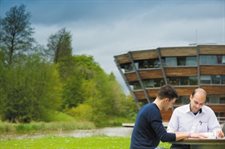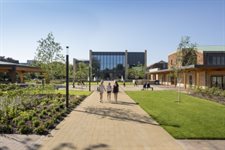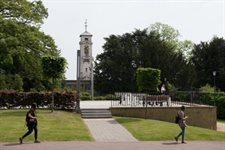Estates Development Framework
The future of our UK estate



The university appointed Gleeds Management Services in 2019 to carry out an Estate Development Framework (EDF) exercise in parallel to, and following, the publication of the University Strategy in December 2019. The Estate Development Framework (EDF) has been developed as a clear, dynamic and viable long term vision for the University Estate. It sets out the principles by which the university should plan future development, re-modelling and management of its campuses and wider estate.
The formulation of the framework has been an iterative and consultative process involving a wide spectrum of stakeholders and has taken into account site specific opportunities and constraints.
The EDF was developed with expert input from MCW Architects – appointed as Lead Consultant and Masterplanner - alongside a full consultant team managed by Gleeds Management Services.
View the full Estate Development Framework here
Introduction
The university’s campuses are central to its sustained growth and attractiveness and we know they are hugely important to the attraction and recruitment of staff and students. Our campuses are known for their green spaces, hidden corners, diversity of landscape, planting and architecture and are home to over 4,000 students and staff. We are fortunate to have these fantastic resources as we plan ahead for the future needs of our university. We know, through consultation on the University Strategy, that sustainability is incredibly important to us all and our campuses demonstrate some highly regarded examples of best practice. The guiding vision for the Estate Development Framework (EDF) is “Evolution without a carbon footprint”.
Our current and past students, and staff, have a strong emotional connection with the campuses on which they were taught and an affinity with how we will develop them in the future.
The EDF recognises the university's commitments to equality, diversity and inclusion and, through consultation – both on the University Strategy and the EDF itself – we understand the changes we need to make to our estate to reflect the needs of our community. Following the publication of the EDF we are developing detailed guidance and standards for future projects (both refurbishment and new build) that will support and deliver on these commitments.
The university has strengthened its commitment to making a meaningful civic contribution, and the way our campuses are accessed and opened up to our local and wider communities has never been so important. Whilst we make an undoubted economic and cultural impact we will need to strengthen the visibility of that within Nottingham and across the East Midlands. Strengthening our physical presence in the city will be an important element of that ambition.
We know that higher education is changing and is likely to see even greater change in the future as changing demands are placed upon it. That has been thrown in to even sharper focus by the Covid-19 pandemic. Whilst there have been many difficult and challenging elements to deal with we have also seen new possibilities with the adoption of greater agility and the adoption of a ‘work from anywhere’ approach. We have seen changing demands on our real estate and questioned how we might accelerate and support blended learning and teaching with changes in pedagogy that will place different demands on our campus in the future.
Themes
Through consultation the development framework shaped 11 themes against which it would be structured. These, effectively, form chapters within the EDF. The 11 themes, or chapters, set out are described in detail in the full EDF document. These chapters were developed and approved by the Estates & Infrastructure Committee, University Executive Board and University Council.
- Objectives, Context and Heritage
- Teaching and Learning Space
- Research and Knowledge Exchange
- Civic Presence and Engagement
- Transport, Accessibility and Way Finding
- Well-being and Equality Diversity and Inclusion
- Environment, Ecology and Sustainability
- Branding and Marketing
- Sport and Recreation
- Digital Interface
- Amenities – catering, commercialisation etc
Guiding principles
Through consultation, eight guiding principles were developed against which each of the 11 themes/chapters were tested.
We recommend these guiding principles are formally adopted by the university:
- Digitally enabled
- Innovative approach
- Sustainable, healthy and promotes wellbeing and EDI for staff, students and visitors
- Cost effective and financially achievable
- Continuously improving student and staff experience
- Maintaining a campus to be proud of
- Flexible and adaptable to future requirements for the university’s core business of teaching and research
- Welcoming and accessible to all
For any queries please contact the Estate Office